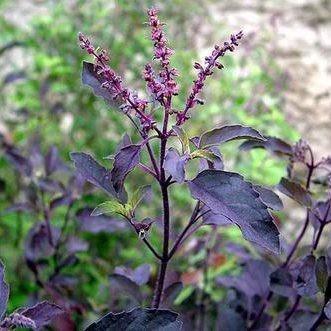

karum thulasi
₹99.00 Original price was: ₹99.00.₹49.00Current price is: ₹49.00.
Details:
Karum Thulasi is a striking and spiritually significant plant that brings both beauty and health benefits. Whether you’re growing it for its unique, dark purple foliage, its religious importance, or its medicinal properties, it makes a wonderful addition to any home or garden. It’s a relatively easy plant to care for, as long as it’s provided with adequate sunlight, well-draining soil, and moderate watering.
Description
Karum Thulasi (also known as Black Tulsi or Krishna Tulsi) is a variety of Tulsi (Holy Basil) that is highly regarded in many cultures for its religious significance, medicinal properties, and aromatic leaves. It is native to the Indian subcontinent and is commonly grown in gardens for both its spiritual importance and health benefits.
Here’s a detailed description of the Karum Thulasi plant:
Scientific Name:
- Ocimum sanctum (commonly known as Tulsi or Holy Basil)
- Variety: Krishna Tulsi or Black Tulsi (Ocimum sanctum var. Krishna)
Common Names:
- Karum Thulasi (Tamil name)
- Black Tulsi
- Krishna Tulsi
- Shyama Tulsi (in some regions)
Appearance:
- Leaves: The leaves of Karum Thulasi are usually dark purple to blackish in color, giving it a unique and striking appearance compared to the more common green Tulsi varieties. The leaves are oval, with serrated edges and a slightly rough texture. They have a strong aroma, especially when crushed.
- Stems: The stems of this variety are also dark purple to blackish in color, which is why it’s called Black Tulsi or Krishna Tulsi. These stems can grow quite tall and often have a bushy appearance.
- Flowers: The flowers of Karum Thulasi are small and typically white to light purple. They grow in clusters and appear in spikes during the blooming season. Although the flowers are not as prominent as the leaves, they still add to the plant’s overall beauty.
- Size: Karum Thulasi can grow up to about 2 to 3 feet (60 cm to 90 cm) in height, depending on the growing conditions. It can be pruned to maintain a compact shape and encourage new leaf growth.
Growing Conditions:
- Light: This variety of Tulsi prefers full sun and should be placed in a location that receives at least 6 hours of direct sunlight per day. Tulsi plants are sun-loving, and sufficient light is necessary for healthy growth and vibrant leaf color.
- Temperature: Karum Thulasi thrives in warm temperatures, typically between 75°F to 95°F (24°C to 35°C). It does not tolerate cold temperatures and should be protected from frost. In cooler climates, it can be grown in pots and brought indoors during winter.
- Soil: It prefers well-draining, fertile soil that is rich in organic matter. A slightly acidic to neutral pH (6.0–7.0) is ideal. Tulsi plants can tolerate a variety of soils, but they do best in a sandy loam mix.
- Watering: Karum Thulasi requires moderate watering. It prefers moist, well-drained soil but does not like to sit in stagnant water. It’s important to allow the top layer of soil to dry out slightly before watering again. During the rainy season or in humid climates, reduce watering frequency to prevent root rot.
- Humidity: While this variety can tolerate average humidity levels, it thrives in areas with moderate to high humidity, especially if grown outdoors.
Care:
- Pruning: Regular pruning is important for maintaining the shape and health of Karum Thulasi. Pinch off the tips of the plant to encourage bushier growth. Removing the flowers is also beneficial for encouraging leaf production, as Tulsi plants often stop growing leaves once they flower.
- Fertilizing: Tulsi plants generally do not require heavy fertilization. However, during the growing season (spring to summer), you can feed the plant with a balanced, organic fertilizer to promote healthy growth and vibrant foliage. Avoid over-fertilizing, as this can cause the plant to become leggy.
Health Benefits:
Like other varieties of Tulsi, Karum Thulasi is highly valued in traditional medicine for its antioxidant, anti-inflammatory, and adaptogenic properties. Some of the health benefits of Karum Thulasi include:
- Boosting immunity: The plant is known to support the immune system and help fight off common colds and infections.
- Reducing stress: It has adaptogenic qualities, helping the body cope with stress and anxiety.
- Promoting digestion: The leaves of Karum Thulasi are often used in teas or extracts to aid in digestion and promote a healthy gut.
- Antioxidant and antimicrobial: The plant’s compounds have antimicrobial properties, helping to combat bacterial and fungal infections.
- Respiratory health: Tulsi is known for its ability to support respiratory health and is often used to treat ailments like cough, asthma, and bronchitis.
Religious and Spiritual Significance:
In Hinduism, Karum Thulasi (Black Tulsi) holds a sacred place. It is often planted near homes or temples and is considered an essential plant in the worship of Lord Vishnu and his avatar, Lord Krishna. The leaves are often used in pujas (rituals), and offering them to Lord Krishna is believed to bring blessings, peace, and prosperity.
Pests and Problems:
- Pests: Karum Thulasi can occasionally attract pests such as aphids, whiteflies, and spider mites. Regularly inspecting the plant and using neem oil or an insecticidal soap can help control infestations.
- Diseases: Overwatering or poor drainage can lead to fungal infections or root rot. Make sure the plant is grown in well-draining soil, and avoid waterlogging.
Toxicity:
Karum Thulasi is generally non-toxic to humans and pets. However, it is always best to avoid ingestion in excessive amounts, as with any plant, to prevent any potential allergic reactions or digestive issues.



Reviews
Clear filtersThere are no reviews yet.